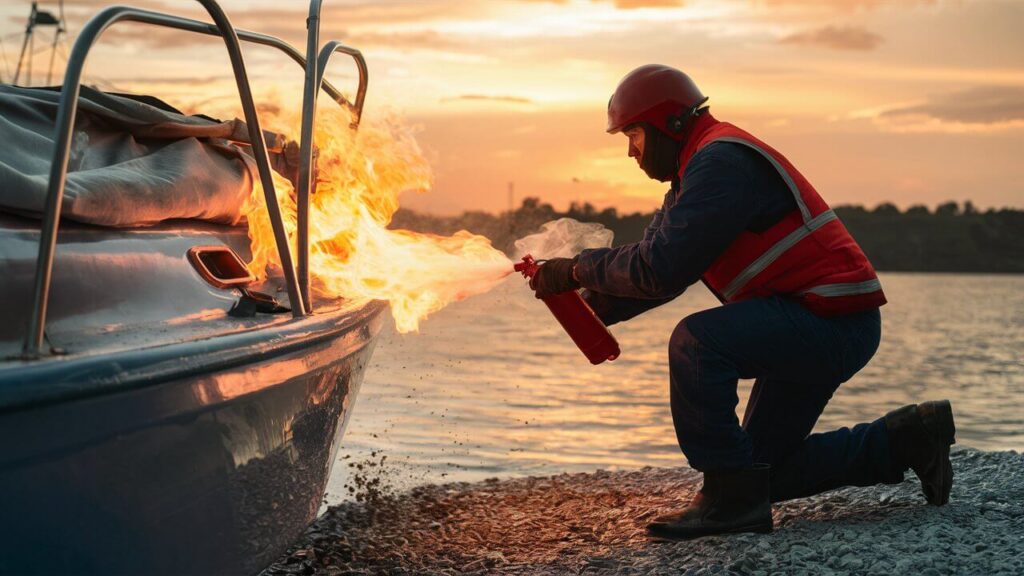Yes, fiberglass boats are flammable. While the glass fibers themselves are not combustible, the resin used to bind them together is highly flammable. Fiberglass resin is very flammable, and if a fiberglass boat catches fire, it can burn rapidly and intensely, releasing toxic fumes in the process.
Why Fiberglass Boats Burn So Easily
Fiberglass is made by combining glass fibers with a polymer resin, usually polyester or vinylester.
These resins are petroleum-based and highly flammable. When exposed to high heat or an open flame, the resin can ignite and spread fire quickly throughout the boat.
Fiberglass is a highly combustible material that can ignite easily and release toxic fumes when burning. The combination of flammable resin and the boat’s confined spaces with plenty of fuel sources (such as upholstery, wiring, and fuel tanks) creates a dangerous fire hazard.
Want to avoid costly fiberglass boat repair mistakes?
Learn how to inspect damage properly, decide when to DIY, and prevent expensive fiberglass problems before they start.
==>> Also read: How strong is Fiberglass?
The Speed and Intensity of Fiberglass Boat Fires
Once a fiberglass boat catches fire, the flames can spread rapidly due to the highly flammable nature of the resin.
The heat generated by the burning resin can cause the fire to grow in intensity, making it difficult to control and extinguish.
In a discussion on a boating forum, one user shared their experience with a fiberglass boat fire, stating, “I’d say 20 minutes the boat is probably gone.” This highlights the alarming speed at which a fiberglass boat can be consumed by flames.
Toxic Fumes Released During a Fiberglass Boat Fire

In addition to the rapid spread of flames, burning fiberglass also releases toxic fumes.

This guide helps boat owners understand fiberglass damage clearly — what matters, what doesn’t, and when repairs are truly necessary, so small issues don’t turn into expensive mistakes.
See What Every Boat Owner Should Know →When the resin burns, it emits hazardous chemicals such as carbon monoxide, hydrogen cyanide, and other harmful substances.
Inhaling these fumes can cause serious health issues, including respiratory problems, headaches, and even unconsciousness or death in severe cases.
Preventing Fiberglass Boat Fires
To minimize the risk of a fiberglass boat fire, boat owners should take several precautions:
- Regularly inspect and maintain electrical systems to prevent short circuits and overheating.
- Store flammable materials, such as fuel and oil, in properly ventilated areas away from heat sources.
- Install smoke alarms and fire extinguishers onboard and ensure they are in working order.
- Avoid smoking or using open flames on the boat, especially near fuel sources or in enclosed spaces.
- Educate passengers about fire safety and emergency procedures.
What to Do in Case of a Fiberglass Boat Fire

If a fire does break out on a fiberglass boat, it is crucial to act quickly and follow these steps:
- Ensure all passengers are wearing life jackets and prepare to abandon the boat if necessary.
- Use a fire extinguisher to attempt to put out the fire, aiming at the base of the flames.
- If the fire is too large to control, make a distress call and prepare to evacuate the boat.
- Move upwind of the fire to avoid inhaling toxic fumes.
- Once safe, contact the coast guard or local authorities for assistance.
The Bottom Line
Fiberglass boats, while popular for their durability and low maintenance, pose a significant fire risk due to the flammable nature of the resin used in their construction.
Boat owners must be aware of this risk and take appropriate precautions to prevent fires and ensure the safety of those onboard.
So, by understanding the dangers associated with fiberglass boat fires and being prepared to handle emergency situations, you can enjoy your time on the water with greater peace of mind.

Warren is the founder of BoatGenesis and brings practical experience in fiberglass boat repair, marine equipment testing, and powerboat building. He has worked on a range of repair and restoration projects and now focuses on creating clear, research-based guides to help boat owners avoid costly mistakes and make smarter maintenance decisions. Learn more about Warren.




